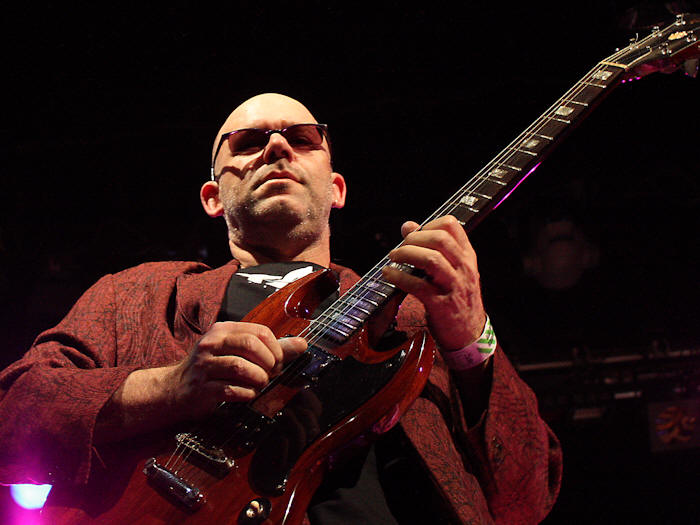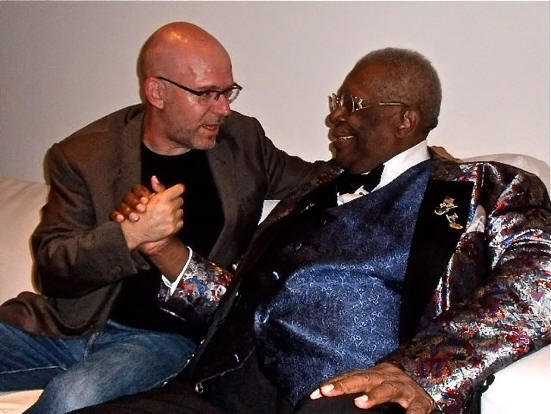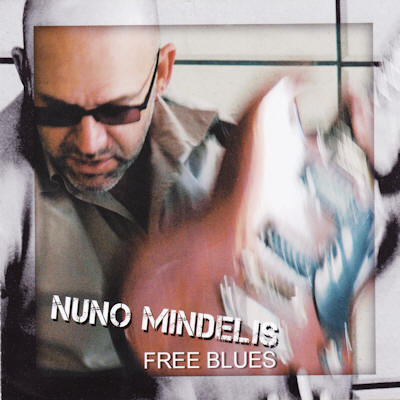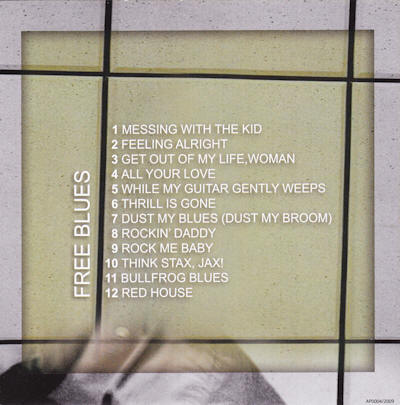
Painting © 2004 Loz
Arkle
Website
© Copyright 2000-2011 Alan White - All
Rights Reserved
Site optimised for Microsoft Internet Explorer
Early Blues Interview
|
|
Alan: What are your first musical memories growing up in Angola / Brazil? Nuno: In the very early years, I used to listen to the classical music that my parents were listening to. When I was six my mother gave me a Beatles single, A side was Hey Jude, and B side Revolution. At the age of nine I heard Otis Redding, as per advice of an older mate who noticed my literal obsession for music. So I indirectly took acquaintance with Booker T & The MGs at that time too. By extension I heard James Brown, Wilson Picket and others, as I was very interested (and much impressed) by soul music. At eleven I remember having heard Big Bill Broonzy, and from then on I literally heard everything that was being recorded on the planet, US and English bands and artists, Spanish and Brazilian guitarists, jazz, fusion, everything.
Alan: Did you come from a musical
family? Alan: Did you always want to become a musician and what first attracted you to the world of music? Nuno: For me, it seems that I was born a musician. The same way I can draw. An innate thing. I don't remember myself as a non musician. So I didn't even have to decide if I wanted to be a musician or not, everything I was doing outside music was a detail: school, regular jobs etc.. If there was any crucial input which attracted me to the world of music, then it might have happened during that period in which you can't remember yourself, like when you're three or four years old. Maybe something I heard at that time.
Nuno: Before 9 years old I was already trying to manufacture my own instruments, like playing drums with cans, kitchen vessel, pretending to play guitar with tennis rackets etc. I also came to build some kind of acoustic guitar with a 5 litre Portuguese oil can (as the body) and a piece of wood (scale) and fishing line as strings (I have a replica here, kids still build those in Angola). When I was 9, my father finally bought me a real acoustic guitar (I guess it was an English one, actually). I simply never stopped playing from then on. I started copying every hero such as The Beatles, Otis Redding, etc.. Later Santana, Hendrix, Jimmy Page, Eric Clapton etc. When I was 14, I was invited to play the guitar in one or two tracks for a prestigious Angolan band's album, the producer's idea was to mix their African music with psychedelia , Hendrix etc. That was my first paid work, I was in school (still wearing trunks), just a child, and a car (from Philips/Polygram?) was sent to pick me up, all my little mates were very proud of me. And so was I (-: I used the money to fix up a bike, at the time. Alan: What kind of material were you playing in the early days? Nuno: During the learning phase I was copying The Beatles, Otis, Santana (I copied Santana's version intro of Black Magic Woman's note by note at the age of 11). A bit later (14/15 years old) I founded a trio (Cavanah Blues Band) and we used to play Taste (Sugar Mama), Stephen Stills (Go back home), Big Bill Broonzy (Hush), The Bluesbreakers (All your love), Blindfaith (Had to Cry Today), Dave Mason (Feeling Alright), Ten Years After (I'm going home), Supersession (Kooper, Stills, Bloomflield), Rolling Stones (Lady Jane), etc. Then the war came and I had to take a long break... Alan: Who are your favourite artists? Nuno: Booker T & The MG's, Otis Redding, Little Walter, Howlin' Wolf, Elmore James, John Lee Hooker, Jimi Hendrix, Skip James, Bob Dylan, Van Morrison, Rolling Stones, Pink Floyd, Jimi Hendrix, Wes Montgomery, Bill Evans ... ... ... (not necessarily in this order) . Alan: Who has influenced you the most in your music writing and playing? Nuno: Can't probably be so precise here, it is an amalgam of everything I heard in earlier years, but I guess that Steve Cropper, Santana, Hendrix, Clapton and B.B. King had a lot of influence in the way I play. Guys like Rory Gallagher, Johnny Winter, John Fogerty and bands like The Faces, Fleetwood Mac (early years) and Canned Heat too. As for the Rhythm Guitar, I had a lot of influence from piano players like Otis Span and Memphis Slim. I tend to use more piano typical lines and chords than guitar ones.
Nuno: My first LP (Blues & Derivados, 1989/90) got consistent airplay, first in two influential radios. This "contaminated" the rest of the press in general, newspapers, TV, etc. Alan: You've released a number of albums and appeared at many blues festivals around the world, tell me what have been the highlights so far? Nuno: The Montreal International Jazz Festival, announced alongside people like Prince, Diana Krall, Oscar Peterson, George Benson, John McLaughlin and so many others. Also, touring with Tommy Shannon and Chris Layton, (and Uncle John Turner, Johnny Winter's first drummer) playing the Antone's 20th Anniversary in Austin/TX alongside Storyville (Chris, Tommy, David Grissom), Doyle Bramhal, Junior Wells etc. Alan: Of all the artists you've appeared with, who has impressed you the most? Nuno: Larry McCray. I wanted to quit playing guitar when I heard him (live), and I can't even think about singing ever again after he sings. His art certainly has an unusual strength and power. Alan: Tell me a little about the blues scene in Brazil? Nuno: The blues in Brazil can still be called a baby. This is because it was "discovered" thirty years after the blues boom of the 60s. I arrived here in 1976 and I was perceived like some alien to a lot of people because I was playing the blues. Only after 1987 or 1988 there was a blues "discovery" in Brazil. Then someone connected the dots, "oh, I remember there is a weird guy who has been doing this for a long time" guess his name is Nuno". By then, a lot of kids got familiar with the blues and they are now the ones who help to keep the blues alive here. Alan: How healthy do you think the blues scene is in the UK/Europe compared with Brazil? Nuno: Technically, it is much healthier in UK/Europe because of the long tradition. I guess in terms of acceptance and market too because one thing leads to the other. On the other hand, Brazil has its own very strong musical culture, so it is a musically self-sufficient country, say, which doesn't pay much attention to foreign music. Only a minority do that. And most of the ones who play the blues here do it from Steve Ray Vaughan on, that's a fact.
Nuno: By the time I played the Antone's Anniversary, the headline in the "Austin Blues" newspaper announced: The Brazilian beast is coming to your town". Alan: Your music is a blend of blues/rock/soul, tell me a little about your musical styles. Nuno: Although I am known as a blues guitarist, the fact is that I was very heavily influenced by soul, folk, rock, jazz and even classical melodies. And when we listen to Booker T & The MGs (as I did obsessively) we actually have all that kind of music at once. A bit later, those childhood impressions of Otis Redding became a little dormant say, because I was taking a close watch at all those changes in the music scene: the Woodstock, progressive, jazz fusion. But that stays in your musical DNA, like a stamp. One day, later on, it will wake up. I was also very influenced by literature, poetry, and have always actually faced a conflict in this subject. That is because my musical heroes were English-speaking artists, while my literary heroes were Portuguese poets and writers, like Fernando Pessoa, Eça de Queiroz and many others. The limited skill in the English language probably led me away from poetry and song writing and more towards an instrumental practise. Alan: Are there any particular songs that you play that have special meaning to you? Nuno: Practically all the songs in my most recent album Free Blues have a special meaning to me. This was actually the main idea of the album, to do songs that somehow changed my life when I was a kid, while adding a more contemporary feel to it. Messing with the Kid, (also in Rory Gallagher's "Live in Europe" version) All Your Love, Feeling Alright , Red House, Thrill is Gone, Bullfrog Blues, Rock Me Baby, etc. Alan: Tell me about the making of your new album "Free Blues"? Nuno: It was a different process from what I am used to doing. In general I get to the studio with the band, count to four and record "live in the studio", no overdubs except for the vocals at the end. So basically we play together and have fun. In Free Blues, however, I did everything separately, first recorded the drums, (or used several drums samples sometimes combined with electronic drums or real drums played real time), then I would record the bass myself (in most of the songs) or would invite my bass player to do a track or two, etc. In this process I had time to think, to decide on the arrangements, if a song should go electric or acoustic, slide guitar or acoustic piano, things like that. In other words, a lonely (and less fun) process, because time generates doubts, and doubts generate anguish. (-: I also had to learn new technologies in music recording, electronic, samplings, beat loops etc. etc. It took me about three years of isolation and much loneliness to do Free Blues. But I think it was worth it. Everything has to evolve, and so does the blues.
Alan: Some music styles may be fads but the blues is always with us. Why do you think that is? Nuno: There is definitely something about the blues, some magic. I think that the Blue note has an addictive component, the same you find in drugs and when people fall in love. (-: Also, very deep roots, impossible to get away from. Alan: How do you see the future of blues music? Nuno: I have been wondering whether another "Blues messiah" would again appear. We had the blues boom in the 60s, (lasted until the very early 70s) then we had another rebirth with Steve Ray Vaughan in the early 90s which lasted until what, 2000, 2001... Meanwhile music changed a lot, either the way of doing it, selling it or listening to it. The blues that is getting produced these days is just repeating old formulas, the guys smoke and know the rules as nobody else, but simply won't change them. In case its language doesn’t get reinvented (by the ones who know it's rules very well, this is mandatory of course), the blues may become like rare paintings: priceless, but confined to museums or private collectors. Like traditional jazz (Jazz Festivals don't play jazz anymore, with a few exceptions). Note that the evolution (and revolution) of the blues was only possible because people like Eric Clapton, John Mayall, Stones, Zeppelin, Hendrix and all the many others we know injected electricity, psychedellia and rock & roll into it. It was already a reinvention by then ("real thing" people like Muddy came to disagree with such changes at the time). I'd say we’re living a similar moment, and the injection should also include electronic, and other contemporary elements. That's how things keep going from generation to generation and stay alive. Alan: In 2008 you made a rare UK appearance at the Great British Rhythm & Blues Festival, Colne, are we likely to see you back in the UK soon ? Nuno: I really wish so. I will cross my fingers for British promoters to call me back. Hello British promoters! Alan: Nuno, thank you. _________________________________________________________________________
Nuno Mindelis's new CD 'Free Blues' is available from Amazon and CD Baby
"Blues classics painstakingly given an
imaginative, progressive, contemporary treatment
Return to
Blues Interviews List |








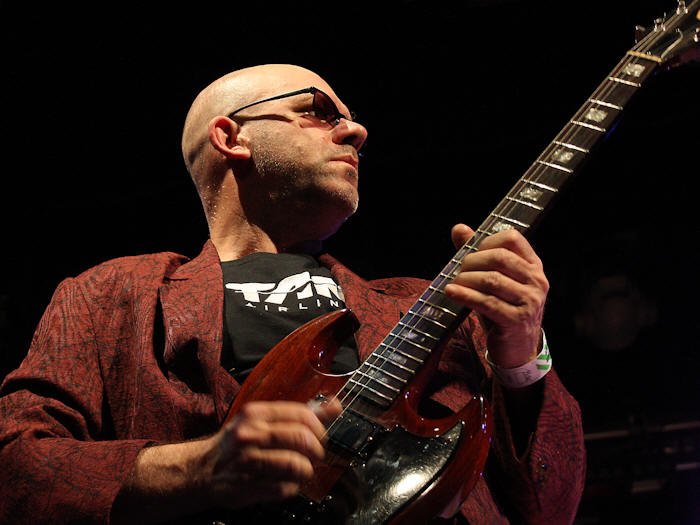
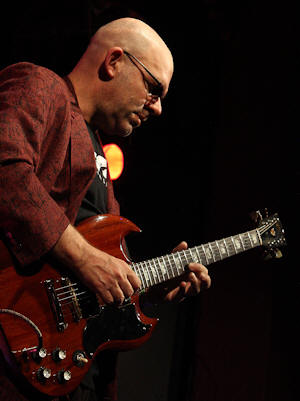 Alan: How did you get started in music and at what age did you
start?
Alan: How did you get started in music and at what age did you
start? 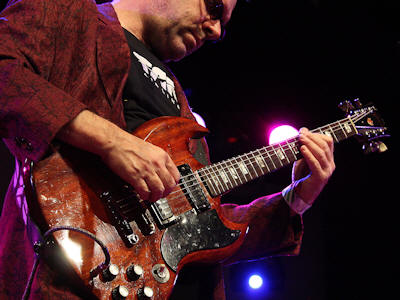 Alan: What was your first real break in the music industry?
Alan: What was your first real break in the music industry? 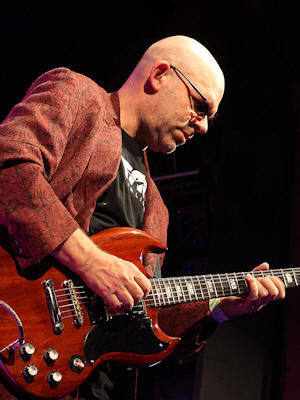 Alan: How did you get the nickname "The Beast from Brazil"?
Alan: How did you get the nickname "The Beast from Brazil"? 